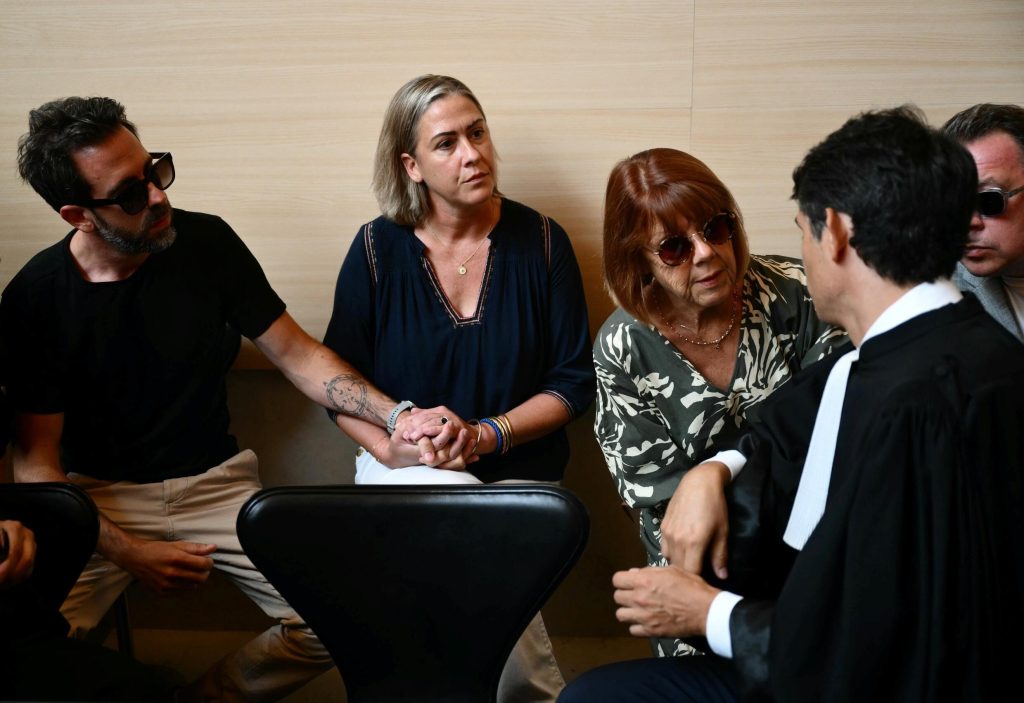On Monday, September 2, 2024, the trial for the Mazan rapes opened before the Criminal Court of Vaucluse in France, scheduled to last four and a half months. For over ten years, Dominique Pélicot recruited dozens of men through a dating site known for being a haven for sexual offenders, with the aim of having these individuals abuse and rape his ex-wife, Gisèle Pélicot. At the time of the acts, Gisèle was unconscious and drugged with anxiolytics.
During these ten years, she experienced memory lapses and gynecological pain, leading her to consult several healthcare professionals without any of them suspecting the chemical submission she was enduring. Her pathologies greatly concerned her family and friends, who thought she was suffering from a serious illness.
It was not until 2020 that Gisèle Pélicot discovered the horrific facts.

On November 2 of that year, she went to the police station to join her ex-husband, who had been accused of filming up the skirts of three women in a shopping center two months earlier. It was at this moment that she discovered with horror more than 20,000 photos and videos of her naked and unconscious, some of which depicted rapes and barbaric acts. These materials, found by the police on the devices of someone she had considered a respectable man, constitute the main evidence in the trial, and of the chemical submission endured.
Although the police has identified 72 men who abused and raped Gisèle Pélicot between July 2011 and October 2020, it is difficult to estimate the exact number of crimes and offenses she suffered. When the facts were revealed, her daughter, Caroline Darian, founder of the association M’endors pas, an organization fighting against chemical submission, as well as her stepdaughters also discovered they had been victims of their father and stepfather’s abuses upon finding photos of themselves naked taken without their consent.
This case, in which Gisèle Pélicot refused a closed-door trial to ensure that “shame must change sides,” highlights an alarming reality about patriarchal society and forces us to acknowledge the extent of the phenomenon of chemical submission, consisting of administering psychoactive substances to the victim to commit a crime or offense, most often sexual.

is seen arriving in court
This trial, deemed “extraordinary” by many media outlets, features 51 defendants, the majority being tried for “aggravated rape,” including the victim’s ex-husband, who orchestrated a decade of abuse and rape of his ex-wife with whom he lived for over 50 years.
The profiles of the accused are diverse: ranging in age from 26 to 74, some are fathers, while others hold professions serving the civil society, such as military personnel, firefighters, or former police officers… In other words, they are ordinary people.
Thus, this “chemical submission” trial, as it is referred to by the media, also exposes the normalization of sexual violence and the rape culture present in our society.
CHEMICAL SUBMISSION: A PUBLIC HEALTH ISSUE
A lesser-known and underestimated phenomenon in France, chemical submission is not limited to recreational settings, where many cases of forced GHB administration, also known as “the rapist’s drug » have been reported. Victims are mostly adults and women (82% of cases), but investigations also record cases of child victims and male victims.
In most reported cases, chemical submission involves the victim’s close circle, using medications such as sleeping pills, anxiolytics, sedatives, or antihistamines. Each year, the home ranks as the location where the highest number of assaults occur.
This is the case in the Mazan affair.
In 2021, the National Agency for the Safety of Medicines recorded 727 reports of chemical submission in its annual survey on the phenomenon. Among these reports, 56% involve psychoactive medications, while the rest involve non-medicinal substances.
This disproves the misconception that GHB is the only « rapist’s drug ».
86.4% of reports were made following lawsuits, allowing access to toxicological analyses for the victim, as valid evidence in the context of a judicial investigation. With recent movements like #BalanceTonBar and #MeTooGHB symbolizing a liberation of speech, there has been a significant increase in reports related to chemical submission. In 2022, there was a 69% increase in reports, reaching 1,229 people. However, the limited time frame in which psychoactive substances can be detected (within a few hours in the blood and within a few days in the urine), makes it difficult to estimate the actual number of victims of chemical submission.
Another issue highlighted by pharmacist at the Paris Addictovigilance Center, Leïla Chaouachi, in her interview for LePoint is the lack of awareness about a public health phenomenon among medical professionals.

LACK OF MEDICAL TRAINING TO PREVENT CHEMICAL SUBMISSION
Leïla Chaouchi, who has already conducted several prevention workshops on the subject, suggests continuous training for healthcare providers on how to react with the patients concerned, and to frequently address sexual topics with patients to prevent the phenomenon.
Furthermore, a 2010 study by the National Academy of Medicine already highlighted the complete lack of teaching on chemical submission in medical studies, leading doctors to make diagnostic errors.
The study enumerates some suspicious symptoms of chemical submission: signs of physical aggression, neuropsychological disturbances that could be due to amnesias caused by the administration of psychoactive substances, or psychomotor agitation linked to stress or anxiety.
The study also warns about the diversity of substances considered “ideal” for chemical submission and the ease of obtaining some of the medications used.
CHEMICAL SUBMISSION: REVEALING OF THE RAPE CULTURE
The lack of prevention and awareness around chemical submission, the invisibility of victims, and the impunity of perpetrators resulting from it, as well as the control over the victim’s body (usually female), are all reasons that show chemical submission as a minimized or even concealed violence.
This minimization of the phenomenon is closely linked to rape culture, a sociological concept used to describe a set of behaviors that normalize, excuse, and justify sexual violence.
Indeed, considered a weapon of rape, chemical submission also reveals the objectification of women’s bodies, a central aspect of rape culture, in which perpetrators disregard the victim’s consent, viewing her as available solely for male sexual desires.
In the Mazan case, this concept is clearly present. In fact, the defense of some of the accused relies on the “consent by delegation”, arguing that the presence of the husband during the rapes committed on Gisèle Pélicot implied consent. Others claim “unintentional rape”, arguing that they had no intention of committing a rape when they went to the Pélicot household, and therefore did not commit the crime.
However, strict rules were put in place by the main accused, Dominique Pélicot, for the men coming to the couple’s home. Parking in a specific place, far from the house, undressing in the kitchen, warming their hands on the radiator—these were all measures taken to avoid waking the victim.
Yet, the defense of “unintentional rape” highlights the controversy in defining rape under Article 222-23 of the Penal Code, which presumes consent and does not state that the absence of consent constitutes the offense according to Catherine Le Magueresse, a law doctor.
Recently, parliamentary debates have taken place regarding the inclusion of the concept of consent in the Penal Code article on rape. In April 2024, France rejected the European Commission’s proposed common definition of rape, which was based on a single principle: “only yes means yes”
AN UNPRECEDENTED MOBILIZATION

On Saturday, September 14, 2024, gatherings took place throughout France, where thousands of people demonstrated in support of Gisèle Pélicot and other victims of rape. The slogan “We are all Gisèle” also gained prominence in the media and social networks.
On Tuesday, September 17, 2024, at the end of the hearing, Gisèle Pélicot was applauded by dozens of people after the first hearing of her ex-husband, who admitted the facts. This unprecedented proximity between the civil society and the victim of this historic trial reveals the potential consequences this trial could have from a legal standpoint.
In fact, this public trial, might lead to changes in the definition of “rape” as stated in Article 222-23 of the Penal Code.
ASSEDEL expresses its full support to Gisèle Pélicot, her family, and all victims of sexual violence and chemical submission.
ASSEDEL calls for the notion of consent to be integrated into Article 222-23 of the French Penal Code.
ASSEDEL proposes the inclusion of studies on the phenomenon of chemical submission in the medical curriculum to enhance the training and awareness of healthcare professionals and improve prevention.
ASSEDEL requests that toxicological analyses be admissible as evidence in judicial investigations, even if they are not conducted based on a judicial requisition.

